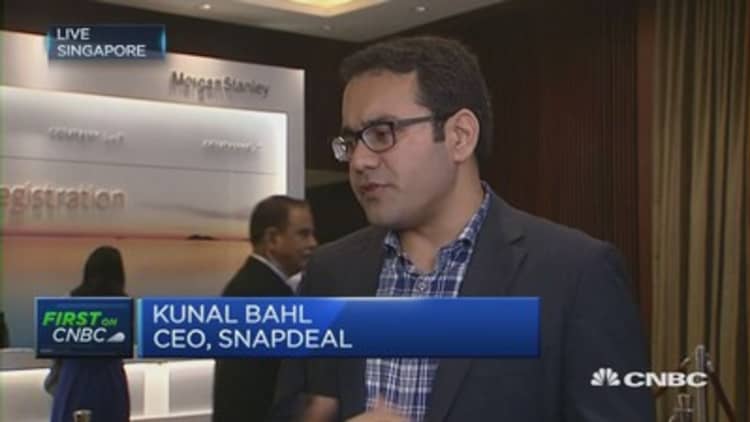Ritesh Agarwal has created India's largest network of budget hotels in less than two years. He's 21.
"I am not being arrogant when I say I re-imagined how new-age hospitality will look like. In just one and a half years we are bigger than the country's largest hotel group by a factor of four," Agarwal, the latest poster boy of India's start-up industry, told CNBC.
Agarwal started out trying to replicate Airbnb in India but soon found that you don't need to emulate something to be successful.
"The best companies in the world are created from personal pain points," said Agarwal, sitting with bare feet in OYO Rooms' bustling office in Gurgaon, an upmarket suburb of New Delhi.
At 17, Agarwal gave up trying to be an engineer. Instead he worked for free at various start-ups and traveled the country. At the end of the journey he got his big idea - he was going to build a credible chain of budget hotels from the existing supply of low-end, unprofessionally run guesthouses that dot India.
Today OYO Rooms partners with 3,000 guest houses across 125 Indian cities. It markets these small hotels online under the OYO brand and works with them to offer basic quality at one-third the market price. Agarwal's disruptive strategies worked and investors have already poured $125 million into OYO Rooms. He employs more than 1,500 people, with a Harvard alumni as his COO, and has a company valued at an estimated $400 million.

Welcome to India's start-up industry; the youngest and fastest-growing in the world.
According to industry body NASSCOM, there are more than 4,000 start-ups in India, with 28 the average age of founders. Money is also pouring in; $5 billion was invested in start-ups this year alone, a 125 percent year-on-year rise, according to NASSCOM.
"You think of India and you think of Bollywood, cricket and now start-ups," says Santosh Dawara, an entrepreneur and one of the founders of the Pune Open Coffee Club, an informal platform open to anyone connected with the start-up industry to meet and brainstorm.
Although still nascent, India's start-up sector already has its heroes to look up to.
From e-commerce site Flipkart, that has taken on Amazon, to Ola Cabs, a taxi aggregator like Uber, fascinating stories are inspiring young people who have begun to take risks without the fear of failure, say experts.
"I am blown away by the passion and determination of the young people," says Sunil Kalra, who has invested in about 60 tech start-ups. "I was in the smoking room at an airport, and a guy agreed togive me a cigarette only if I listened to his idea. He made a pitch right there!"
Young and happening
A young population, increasing smartphone penetration and social media have all been drivers of change, empowering Indians to think out of the box. Just a few years back, Dawara jokes, you could say bye to an arranged marriage if you worked for a start-up. Now it's cool to be working for one.
An estimated 50 percent of Indians are under the age of 25 and the number of mobile internet users is expected to grow to 236 million by 2016, according to an IAMAI & KPMG report, which makes India a huge market for tech-related innovation.
This is evident from the fact that 71 percent, or $376 million worth, of venture capitalists' funds in the September quarter went into Indian IT companies, according to research firm Venture Intelligence.
From Microsoft to Google, global companies are helmed by Indians, building the nation's reputation as one that produces people with a talent for solving problems using technology.
Harshad Bhagwat, 29, was trying to do just that when he started wordsmaya.com. For around $20 a month an adult student can get an English tutor on WhatsApp.
"I realised students want to communicate better in English but don't have the time to go to a class, so I brought it on chat," Bhagwat, who is by training a scientist, told CNBC. It also helped that the mushrooming "English speaking courses" in Indian cities were unable to deliver on quality.
In fact, the "mess of India provides an opportunity," Kalra believes. Indians who left the country in the 80s and 90s, fed up with over-regulation and a lack of infrastructure, have succeeded in advanced nations and are now back in India to solve domestic issues, he adds.
Make in India
The Indian government is also aggressively selling the idea of "Make in India" to create employment, which according to sociologist Shiv Visvanathan is likely to be more successful on an individual level than at a state level, because the "Indian professional is ripe for entrepreneurship."
After two years of stupendous growth, experts feel the next generation of ideas will be locally inspired rather than imported. "I want to be the next Uber will not work anymore," says Dawara.
And OYO Rooms has shown the way.
"Everyone told us this idea will not scale in India, you should do something already done in other parts of the world ... The good news is that we have created a model which is not lent but are lending it. There are already OYO imitators in Southeast Asia and the Middle East," says Agarwal.


